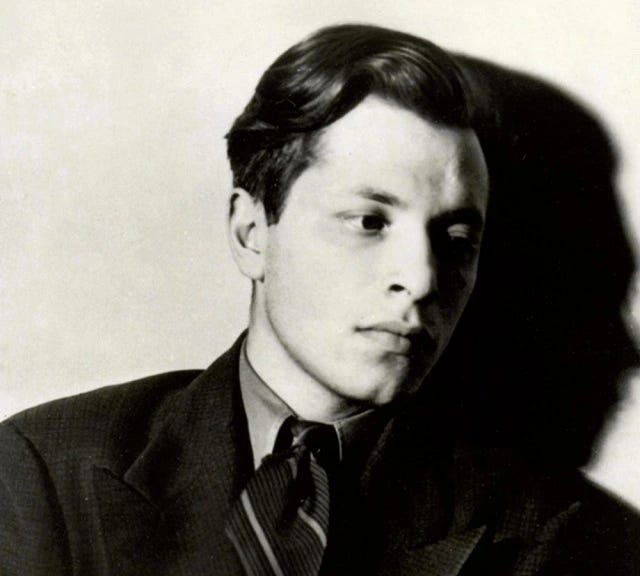What will become of you and me (This is the school in which we learn...) Besides the photo and the memory? (... that time is the fire in which we burn.) Calmly We Walk through This April's Day, Delmore Schwartz
After the publication of his first work, In Dreams Begin Responsibilities (1938), 20-something-year-old poet and critic Delmore Schwartz was considered something of a prodigy in the literary world. Old Possum (Eliot) himself lavished the young man with high praise.
The handsome and precocious son of Romanian Jewish immigrants, Schwartz took it upon himself while an undergrad at Columbia University to create his own personalized curriculum to supplement his assigned studies, a rigorous enterprise which included memorizing ten pages of the dictionary a day. His early success proved fleeting, and while still publishing worthy works of poetry and prose, his short life was characterized by instability, professionally, personally, mentally, spiritually.
Schwartz had the talent and drive that most young writers can only dream of possessing. There are undoubtedly many factors which can account for the failure of promising talent in any field failing to live up to its potential. Schwartz felt like an outsider in the elite circles he often traveled in. This was undoubtedly in part because he was Jewish, although certain temperamental and psychological factors exacerbated by drugs and alcohol cannot be ignored. Schwartz was by all accounts obsessed with his work to the very end; when he could be found, it was typically in some grubby bar, scouring over his meticulously annotated copy of Finnegan’s Wake.
I’ll contrast this sad case with an excerpt that was brought to my attention recently by a friend of Silver Door, written by W.H. Auden in 1962, in which he detailed his ideal “College for Bards”:
In my daydream College for Bards, the curriculum would be as follows: In addition to English, at least one ancient language, probably Greek or Hebrew, and two modern languages would be required. Thousands of lines of poetry in these languages would be learned by heart. The library would contain no books of literary criticism, and the only critical exercise required of students would be the writing of parodies. Courses in prosody, rhetoric and comparative philology would be required of all students, and every student would have to select three courses out of courses in mathematics, natural history, geology, meteorology, archaeology, mythology, liturgics, cooking. Every student would be required to look after a domestic animal and cultivate a garden plot. ... A poet has not only to educate himself as a poet; he has also to consider how he is going to earn his living. Ideally, he should have a job which does not in any way involve the manipulation of words, the best thing he could do is get into some craft.
Discussing this with a handful of comrades it was decided that this curriculum was basically spot on. Schwartz himself was known for his wide breadth of knowledge when compared to his fellow literati, but two items in particular on Auden’s list stand out to me when compared to Schwartz’s career: “The library would contain no books of literary criticism” and “he should have a job which does not in any way involve the manipulation of words…”
In an encouraging note from Eliot found in Schwartz’s hotel room after his death, the old man wanted him to know that “You are certainly a critic, but I want to see more poetry from you.”
It is self-evident to a poet or bard that having a job that does not involve “the manipulation of words” is superior. I can speak from first-hand experience that I found it much easier to write poems in my teens and twenties when I worked strictly blue collar jobs.
It is telling that Auden called it his “College for Bards” and not a “College for Poets.” Bard implies a degree of orality that poet no longer carries. The campfire, not the drawing room. Martin Shaw is a living, breathing example of this venerable tradition, and as a lyric poet who for the past five years has been attempting to slowly make the transition from the written to the spoken word I can say for my younger comrades out there that if I could do it all over again I would have spent far more time memorizing poems, and particularly stories.
Poets and bards will find little love from the Academy at large (with a few exceptions) in cultivating the skills Auden has laid out, most of which require some degree of a tutelage. However, while digital technology is still with us, bands of geographically separated bards and poets can find the resources to learn most of these mental skills. Though importantly, it must be supplemented by the earth, toil, our fellow creatures, and good stories shared over a meal. Lest we find our talents scattered.
We’ll resume the Christianity and Culture series next week. Thank you for your patience.


